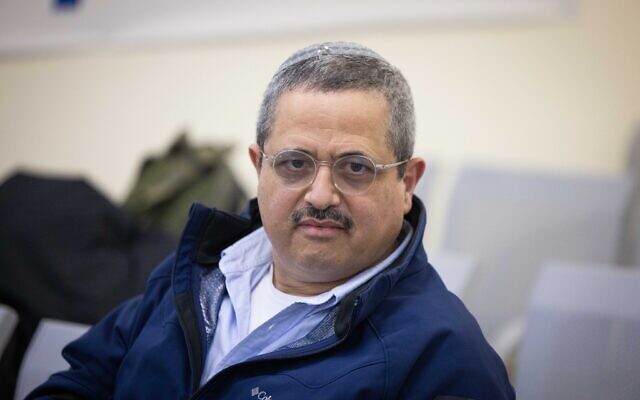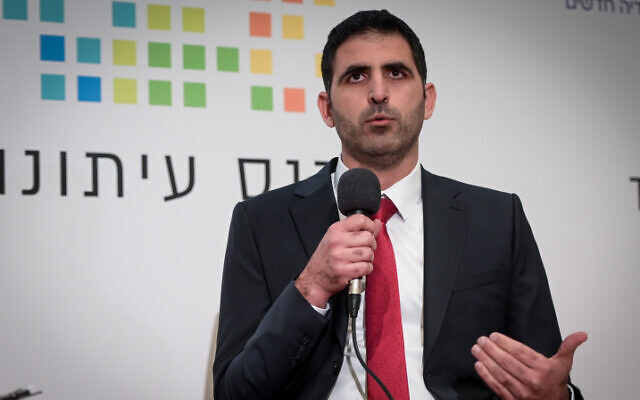Organizers of the protests against the government’s plans to remake Israel’s judiciary and weaken its powers said Saturday that the demonstrations would begin with a minute of silence in the wake of Friday night’s deadly Jerusalem terror attack.
“The murderous attack last night in Jerusalem tears the heart and soul. We share in the pain and mourning of the families of the murdered and wish for the recovery of the injured,” organizers said in a statement.
The main Tel Aviv event will be held without music as a mark of respect for the families of those murdered, the statement read.
Rallies were to be held Saturday evening, as they were last week, at Tel Aviv’s Habima Square and near the Azrieli Center towers.
Additional protests were expected in Jerusalem, Haifa, Beersheba, Herzliya and other cities.
Get The Times of Israel's Daily Edition by email and never miss our top stories
The events are all expected to be held under heavy security, after forces were bolstered across the country and in the West Bank after seven people were shot dead by a Palestinian terrorist outside a synagogue in the Neve Yaakov neighborhood in East Jerusalem.

Members of Zaka Rescue and Recovery team check a body after a terror shooting attack near a synagogue in Jerusalem, Jan. 27, 2023 (AP Photo/Mahmoud Illean)
Police said Saturday morning that the national alert had been raised to its highest level but have not clarified if and how the policing of the protests may be impacted.
Organizers were once again expecting large numbers of people to attend the rallies, after last week’s demonstrations were assessed to have drawn well over 100,000 protesters.
Speakers this week at the Tel Aviv rally were set to include former police chief Roni Alsheich, who oversaw the police investigation into Prime Minister Benjamin Netanyahu which led to an indictment against the premier and his ongoing trial on charges of bribery, fraud and breach of trust.

Former Police Commissioner Roni Alsheich arrives to testify before the Meron Disaster Inquiry Committee, in Jerusalem, January 11, 2022. (Yonatan Sindel/Flash90)
In addition, former MK Shirly Pinto, doctors’ union head Prof. Hagai Levine, and constitutional law expert Prof. Yaniv Roznai will all speak at Habima Square, the Movement for Quality Government in Israel said.
The protests are part of a groundswell of opposition to the hardline government’s plans to overhaul the judiciary.
The plans call to severely restrict the High Court’s capacity to strike down laws and government decisions, and there would also be an “override clause” that would enable the Knesset to re-legislate any such struck-down laws with a bare majority of 61.
The proposed changes would also give the government complete control over the selection of judges; prevent the court from using a test of “reasonableness” to judge legislation and government decisions; and allow ministers to appoint their own legal advisers, instead of getting counsel from advisers operating under the aegis of the Justice Ministry.
Top economists, Israeli bank chiefs and leading businesspeople have warned Netanyahu of potential economic fallout from his government’s proposals for a sweeping makeover of the country’s judiciary.
Bank CEOs told the prime minister on Friday that they are already starting to see money being removed from the country.

A handout photo from the Likud party shows Prime Minister Benjamin Netanyahu meeting with a group of businesspeople at his Likud party’s headquarters in Tel Aviv, January 27, 2023. (Courtesy)
In addition, forty more economists — led by American Nobel Prize-winning economist Eric Maskin and Israel Prize recipient Menahem Yaari — added their names to a letter released earlier this week against the proposed overhaul, bringing the number of signatories to 310.
“The reform of the judicial system endangers the Israeli economy and may cause a drop in Israel’s credit rating, lead investors to flee and bring a brain drain,” they said. “Many studies have already proven that the concentration of vast political power in the hands of the ruling group without strong checks and balances could lead the country to economic decay.”
The letter, initially published Wednesday, has been signed by both right- and left-leaning senior academics, including Nobel Prize winner Prof. Daniel Kahneman and former Netanyahu economic adviser and National Economic Council head Prof. Eugene Kandel.

Tech workers block street to protest judicial overhaul, in Tel Aviv, on January 24, 2023 (Tomer Neuberg/Flash90)
Its release came a day after Bank of Israel Governor Amir Yaron reportedly outlined for Netanyahu the potential consequences of weakening the courts and relayed warnings made by senior economic figures and officials from credit rating firms during his recent meetings at the World Economic Forum in Davos.
According to Israeli television reports, Yaron explicitly told Netanyahu that the shakeup would harm the economy.
A pair of Yaron’s successors, Karnit Flug and Jacob Frenkel, has also spoken out against the government’s plans, warning in an op-ed Sunday that it could negatively affect Israel’s credit rating and “deal a severe blow to the economy and its citizens,” a warning voiced by many workers in the tech sector.
Lawyers, students and other bodies have also expressed alarm at the government’s planned judicial overhaul, which critics warn will undermine democracy and the economy.
Channel 12 and Ynet, citing unidentified sources, reported Friday that the intense public backlash to the planned overhaul has surprised and disturbed Netanyahu, who had hoped to pass changes without bringing on such widespread condemnations and high-profile opposition from numerous leading figures.
The reports said Netanyahu had also wanted to avoid becoming the face of the sweeping reforms, as his ongoing criminal trial ostensibly precludes him from involving himself directly in issues that could influence his legal affairs.
Also on Friday, some 200 leading Israeli musicians signed a petition against the government’s plans to shutter the public broadcasting authority, promising “to fight to preserve democracy.”
The artists — including stars like Shlomo Artzi, Shalom Hanoch, Rita, Ninet Tayeb and Ehud Banai — join hundreds of top actors, directors, and writers who protested earlier in the week against plans to shut Kan.
“It is not a coincidence that those trying to stage a regime change and remove all meaning from democracy have chosen to eliminate public broadcasts as one of their first steps,” said the musicians’ letter.

Protesters against the proposed changes to the justice system at Habima Square in Tel Aviv, on January 21, 2023. (Avshalom Sassoni/Flash90)
Earlier this month, Communications Minister Shlomo Karhi said there was no reason to support state public broadcasting in Israel and indicated he intends to shut down the Kan broadcaster along with additional transmission regulating bodies.
Karhi said the policy of his Likud party was to “remove obstacles and remove regulation” in the industry to allow the free market to prevail.
“In my view, there is no place in this day and age for a public broadcaster when there is a wide range of channels,” he added.
Hundreds of actors, directors, writers, and other figures from the cultural world, along with workers from the Kan public broadcaster, attended a Wednesday meeting held at the Tzavta Theater to oppose the plan.
Ahead of the meeting, organizers said that the corporation provides employment to thousands of people and accounts for about 70 percent of those employed in the film and television industry.
“Karhi is sealing mouths and drying up the fount from which original content draws its power,” the organizers said in a statement. They condemned as a “delusion” the idea that original Hebrew-language content can be produced without public support.

Communications Minister Shlomo Karhi attends a digital journalism conference at Reichman University in Herzliya, January 9, 2023. (Avshalom Sassoni/Flash90)
The Likud party, led by Netanyahu, has long been accused of seeking to shut down Kan due to its criticism of the government while receiving public funding.
Kan hit the airwaves in 2017 after a long legislative battle to shut down and replace its predecessor, the Israel Broadcasting Authority.
At the time, then-prime minister Netanyahu — who also served for years as communications minister — strongly opposed the creation of Kan, reportedly claiming it was too left-wing and too difficult to control.
Internal disagreement on the matter almost brought down the coalition in 2017. However, if the news department were to be closed now, the move would be unlikely to face pushback in Netanyahu’s current hardline right-religious government.


